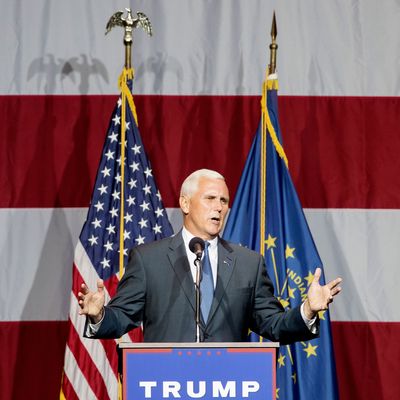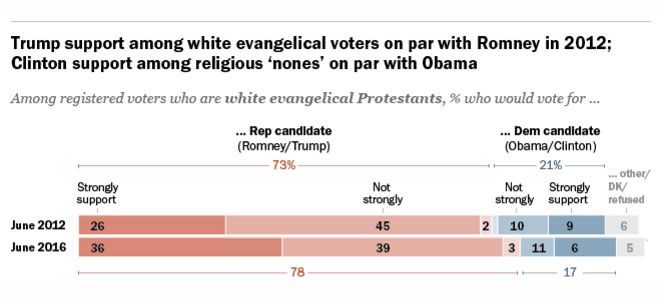
Donald Trump is the strangest candidate either party has nominated in the modern era. He is bizarre not only as freak-show product of tabloid culture, and as a campaigner who eschews even the basic organizational practices of the field, but as an ideological type: a figure who has deviated wildly and repeatedly on social, economic, and foreign-policy issues somehow taking command of a party that has grown ever more resistant to dissent from any element of its orthodoxy. His now-official selection of Indiana governor Mike Pence as vice-president is a sign of his increasing normalization. Trump has aligned himself with the party, and the party with him.
Pence has dissented, at times forcefully, from the positions Trump used to win the nomination. He has endorsed free trade enthusiastically throughout his career, and worked with the George W. Bush administration to enact immigration reform. He called Trump’s proposed ban on Muslim immigrants “offensive and unconstitutional.” In his state’s primary, he endorsed Ted Cruz, then the vehicle for Republicans desperate to derail Trump’s nomination. Pence is also an evangelical Christian, a constituency that was one of Trump’s weakest during the primary.
Accordingly, among Republicans, enthusiasm for Pence is nearly a perfect reverse-indicator for their initial enthusiasm for Trump. Paul Ryan has praised Pence unreservedly. Conservatives who have declared their unwillingness to support Trump have showered his vice-presidents with bouquets. Pence would be the “best choice Donald Trump’s made so far,” says Senator Jeff Flake. William Kristol calls him “a well-informed, principled free market conservative.” Conversely, right-wing writer Ann Coulter, who has thrilled to Trump’s nationalism and lambasted the party’s Washington elite, calls Pence Trump’s “first mistake.”
But to look at Pence as a dissident from Trumpism is to misunderstand the nature both of Pence and his party. Pence didn’t endorse free trade and oppose Trump’s Muslim ban because liberal internationalism runs deep in his soul. He did it because he is a committed movement conservative and party operative, with deep ties to party funders like the Kochs. It served the party’s interest to fight Trump during the primary, but it currently serves that interest to close ranks. The process is occurring already. White evangelical Christians, according to the most recent Pew survey, currently support Trump more enthusiastically than they supported Mitt Romney four years ago:

For his part, Trump has grown increasingly conventional since he has secured the nomination. It is the reverse of the normal pattern, where candidates race to firm up their doctrinal bona fides during the primary, then edge away from them during the general election. Trump has spent less time gesturing in the direction of taxing the rich or mocking the Bushes (a thing he did with gusto even after he had bullied poor Jeb out of the race) and more time driving home conventional attacks about Hillary Clinton’s character. Trump is selecting a standard-issue Republican as his running mate because standard-issue Republicans have decided they can accept Trump.






























